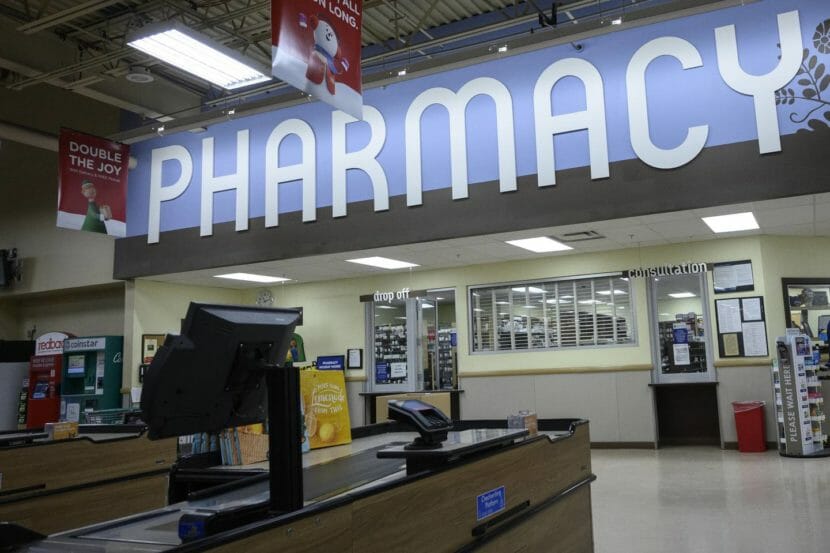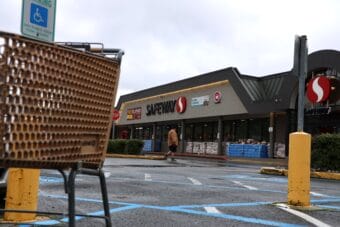
Beginning in January, many Alaskans may no longer be able to go to Fred Meyer pharmacies to pick up their prescriptions.
That’s due to the announced termination of a pharmacy agreement set to end at the end of 2022 between Express Scripts and Kroger, Fred Meyer’s parent company. Express Scripts is a pharmacy benefits manager, a company that acts as an intermediary between many local pharmacies and major health insurance companies to handle reimbursements.
The split will impact thousands of Alaskans who have health insurance through companies that work with Express Scripts, such as TRICARE, Cigna and Premera Blue Cross Blue Shield of Alaska, among others.
Those affected include most Alaskans who signed up for health insurance through the Affordable Care Act marketplace, all military members and their families, employees with federal contracts, all Anchorage municipality employees and many more.
Experts say it will be hard to predict the full impact of the terminated agreement in Alaska, and that it’s possible the two companies could still come to some kind of last-minute agreement before the end of the year.
“It is not unusual for there to be posturing between the two parties as they negotiate,” Lori Wing-Heier, director of the Alaska Division of Insurance, said in an email. She said no contract termination had yet been registered with the state.
But pharmacists interviewed for this story worry that if no agreement is reached, the impact could be significant in Alaska, especially in smaller communities where pharmacy options are already limited and understaffed, leading to long waits and patients being turned away in some cases.
The pharmacists say they anticipate confused customers and long wait times as thousands of prescriptions are transferred away from Fred Meyer to other local pharmacies that will need to step in to fill the gaps.
“This is definitely going to have ripple effects throughout the community,” said Dan Nelson, a pharmacy manager with Tanana Chiefs Conference.
Nelson and other pharmacists reached for this story also say that an announced merger between Kroger and Albertsons, the company that owns Safeway and Carrs, could further exacerbate the problem — the potential loss of access to Carrs and Safeway pharmacies as well could mean a dearth in pharmacy options for many Alaskans.
Questions of access
Kroger Family Medicine owns 13 Fred Meyer pharmacies around Alaska, or just about 8% of all pharmacies around the state.
A spokesperson with Express Scripts said she couldn’t disclose how many Alaskans were serviced by the company.
“With this change, the vast majority of our customers in Alaska will be able to continue to fill their prescriptions at their pharmacy,” Justine Sessions, a spokeswoman with Express Scripts, said in an email.
Alaskans in the military are covered by TRICARE, the health care provider for uniformed service members, which uses Express Scripts for prescriptions.
“We believe there will be minimal impact other than the inconvenience of transferring the prescription to another pharmacy. While Kroger is opting to no longer be a part of the Tricare Network, beneficiaries have other options within the area,” Brandy Ostanik-Thornton, public affairs officer with U.S. Army Alaska, said in an email.
She included a link where military members and their families could use to find a nearby pharmacy.
Premera Blue Cross Blue Shield of Alaska, one of the state’s largest health insurers, also sent a letter out to members this month about the split, informing them what steps to take next.
Premera spokeswoman Amanda Lansford said that while the company is not involved in the negotiations, it is “committed to ensuring our members have access to in-network pharmacies.”
Fred Meyer represents only 8% of pharmacies in Alaska, Lansford said, and every city with a Fred Meyer pharmacy also has one other in-network pharmacy Premera members can use.
While it’s true that Alaskans will have many other options for pharmacies besides Fred Meyer after the termination — Sessions said there were at least 135 others — smaller communities would still likely be affected by the split.
Navigating the changes
A reduction in the number of pharmacy options for patients has the potential to exacerbate staffing challenges and long waits for prescription caused by an existing pharmacist shortage in Alaska.
In Fairbanks, the two Fred Meyers in town are often the busiest and most-staffed pharmacies in the city, according to Nelson, who helps coordinate the delivery of medications to the tribal consortium of the 42 Interior Alaska villages that make up Tanana Chiefs Conference.
He estimated that around a quarter of all Fairbanks residents were enrolled in a health insurance company that contracted with Express Scripts and relied on Fred Meyer to fulfill their prescriptions.
Nelson laid out what might happen to those Alaskans picking up a prescription at Fred Meyer after Jan. 1: First, they would be quoted the cash price for their medication instead of the price that their insurance typically covers.
“Then they’re going to have a heart attack, and need to pay that full cost up front,” he said. Then they would have to manually submit a reimbursement to their insurance company, which would probably be less than what they were expecting.
Meanwhile, the workload for non-Kroger pharmacies in Fairbanks will likely increase by about 25%, Nelson predicted, causing backlogs in prescription transfers that translate to delayed wait times for patients.
The best way for Alaskans to switch pharmacies is to call the pharmacy they are switching to, and say they have a prescription at Fred Meyer that they want to transfer, Nelson said.
His advice to avoid lengthy delays for prescriptions: “Don’t wait until January to change pharmacies: be proactive, change it now.”
Affected Alaskans have likely already received a letter from their health insurance company announcing the change. But Brandy Seignemartin, executive director of the Alaska Pharmacists Association, encouraged those who were unsure to call the number on the back of their health insurance card and ask questions.
She said her biggest priority over the coming weeks will be helping Alaskans figure out how to quickly navigate the potential changes to where they can access care.
“When patients lose their pharmacies, it has an impact on patient health outcomes,” Seignemartin said. “So making sure we can get patients support around where they can get their medications as quickly as possible is going to be incredibly important to make sure that there’s continuity of care.”
Long-brewing problems, imperfect solutions
In letters from Express Scripts and the affected insurance companies, many Alaskans have been offered an option to switch to an online pharmacy managed by Express Scripts at a slightly reduced cost, as a way to offset the loss of access.
Alaska pharmacists reached for this story said they worried that online orders won’t work as well in Alaska as they do in other states due to lengthy distances, extreme temperatures and other challenges related to the state’s remoteness and large swaths of communities not connected to the road system.
“My biggest concern is access,” said Justin Ruffridge, a Soldotna-based pharmacist.
“It’s not good health care for people to lose access to their pharmacies,” Ruffridge said. “It’s not good health care for people to have to question whether or not their prescription is coming in the mail, whether it’s going to be OK sitting outside in a freezing mailbox for the next four hours.”
According to Ruffridge and others, the business practices of pharmacy benefits managers like Express Scripts — especially dismally low reimbursement rates — have led to the closures of many independent pharmacies.
“There’s only so little reimbursement you can accept until you can’t afford to safely staff your pharmacies anymore, which creates so many workforce problems and other issues as well,” Seignemartin said.
Ruffridge views Kroger’s decision as another example of the harm caused by pharmacy benefit managers.
“The more that these practices go on, the more difficult it is for pharmacies to operate in local communities. And you’ll end up with essentially a pharmacy by mail,” he said.
Nelson, the Tanana Chiefs Conference pharmacy manager, said he’s seen firsthand how difficult it can be for medications to be delivered by groups without experience shipping to rural Alaska from warehouses in the Lower 48.
He hears weekly from people whose medication didn’t arrive on time, or is frozen or expired.
“I think there’s a lack of understanding, of, you know, there’s not a road out to all these locations, and it’s going to be put on a plane and a caravan and it’s going to be 50 below,” he said.
This story originally appeared in the Anchorage Daily News and is republished here with permission.



